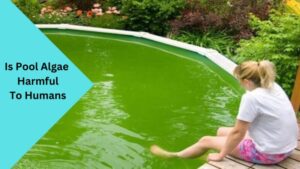Welcome to the mysterious world of pool algae! This seemingly harmless, greenish hue you encounter in your pool – ever wondered how it impacts you? Are these tiny green organisms a threat to your health in any way? Let’s dive into the details and brush away the murkiness surrounding this topic.
In this article, we explore whether or not pool algae pose any risks to human health. We’ll separate the facts from the myths and provide you with all the information you need to assess for yourself what might be lurking in your swimming pool.
The Green Intruder: Identifying Pool Algae
Pool algae are microscopic plants that, if left unchecked, can multiply rapidly in a short span. They typically appear as greenish clouds or spots in your pool, giving the water a murky appearance.
Different Types of Pool Algae
There’s more to pool algae than just the well-known ‘green trouble’. There are mainly three kinds:
- Yellow Algae
Commonly labeled as mustard algae, yellow algae is notorious for its stubborn resistance to regular sanitization methods. But is yellow pool algae dangerous to humans? The risks to humans are negligible, but it does provide an unsightly view and can potentially harbor harmful bacteria.
- Black Algae
Black algae is a more resilient type that roots deep into the pool surfaces. The crucial question remains: is black algae in pool harmful to humans? Data suggests that while black algae is not directly harmful, it can lead to infections if it houses pathogenic bacteria and you happen to have an open wound.
- Red Algae
Red algae in pools, though rare, can cause concern. Although more information is needed, existing research does not link direct harm to humans from red algae alone.
Human Health and Pool Algae: A Dive Into the Connection

Now to the main question of the hour: is pool algae hazardous to human health? The direct answer is ‘no’ – pool algae itself isn’t harmful to humans. The algae are not toxic on their own, and contact with them won’t lead to specific health concerns directly.
However, this isn’t the full story. What makes pool algae undesirable is their indirect impact on pool sanitary conditions and, consequently, your health.
Here is complete guide if you are thinking about Is Swimming Pool Algae Dangerous?
The Invisible Threat: Algae and Sanitation
The presence of algae signifies that your pool chemistry is off-balance, which can pose potential health risks.
- Increased Chemical Resistance: Algae throw off your pool’s chemical balance, and when your pool is full of algae, these pathogens can even build a resistance to normal chlorine levels.
- Bacteria Habitat: Algae can provide a protein-rich environment for E.Coli and other harmful bacteria to proliferate. Thus, even though the algae themselves aren’t harmful, they can indirectly contribute to health risks.
- Pool Surface Hazards: Algae, especially black algae, can cause the pool surface to become slippery, increasing the risk of slip and fall accidents.
Health Implications
The unsanitary conditions favored by algae can lead to several health problems. These may include:
- Skin irritations
- Ear infections
- Gastroenteritis
- Respiratory issues
“The green intrusion in your pool can pave the way for an unhygienic environment, leading indirectly to adverse health ramifications. While pool algae themselves are harmless, their presence is a warning sign of potentially hazardous conditions.”
Cleansing Your Pool: Strategies to Remain Algae-Free
Getting rid of algae isn’t just about the aesthetics of your pool or the pleasant swimming experience, it’s about ensuring a safe and healthy environment. Here are some efficient strategies to tackle the problem:
- Maintain Balanced Pool Chemistry: Regularly check your pool for pH, alkalinity, and calcium hardness. A proper balance can inhibit the growth of algae.
- Sanitize Your Pool: Regular chlorination can help keep algae at bay.
- Mechanical Cleaning: Use pool vacuums, brushes, and automatic pool cleaners to scrape off any initial algae growth.
Also read our latest guide about How to Get Rid of Algae Dust in a Pool
Personal Responsibility: The Key to Healthy Swimming
Correcting the issues resulting from algae growth is fundamental, but ultimately, the responsibility falls upon us to ensure the swimming pools we use – our own or public ones – are clean and healthy.
Remember, time spent in the pool is meant to be fun, relaxing, and promoting well-being, rather than posing potential health hazards. Share the knowledge, create awareness, and ensure the pool you enjoy is safe and sterile.
“Be it your pool or a public one, ensuring a sterile environment is a shared responsibility. Awareness is the first step towards healthy and safe swimming.” You owe it to yourselves and your fellow swim enthusiasts to maintain a clean, health-promoting environment.

Greetings, fellow pool enthusiasts! I’m Turner Davis, your dedicated guide to the world of pool care and maintenance. With over a decade of experience in the field, I’ve made it my mission to transform ordinary pools into extraordinary aquatic retreats.

